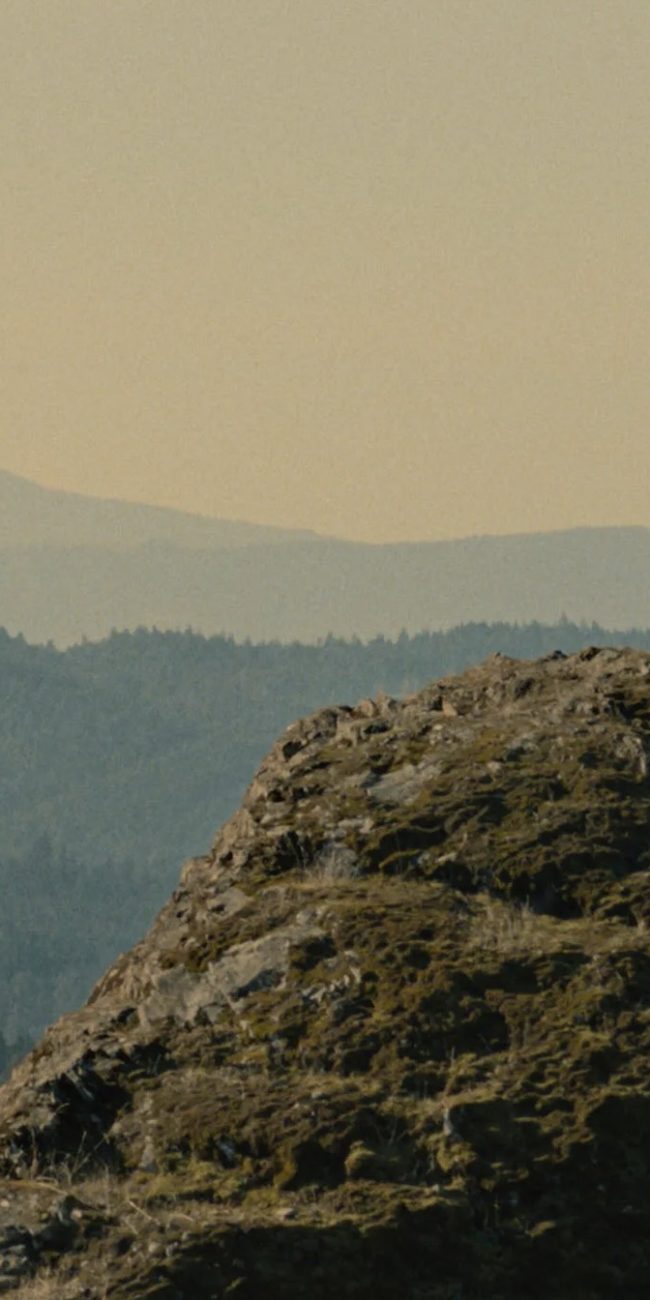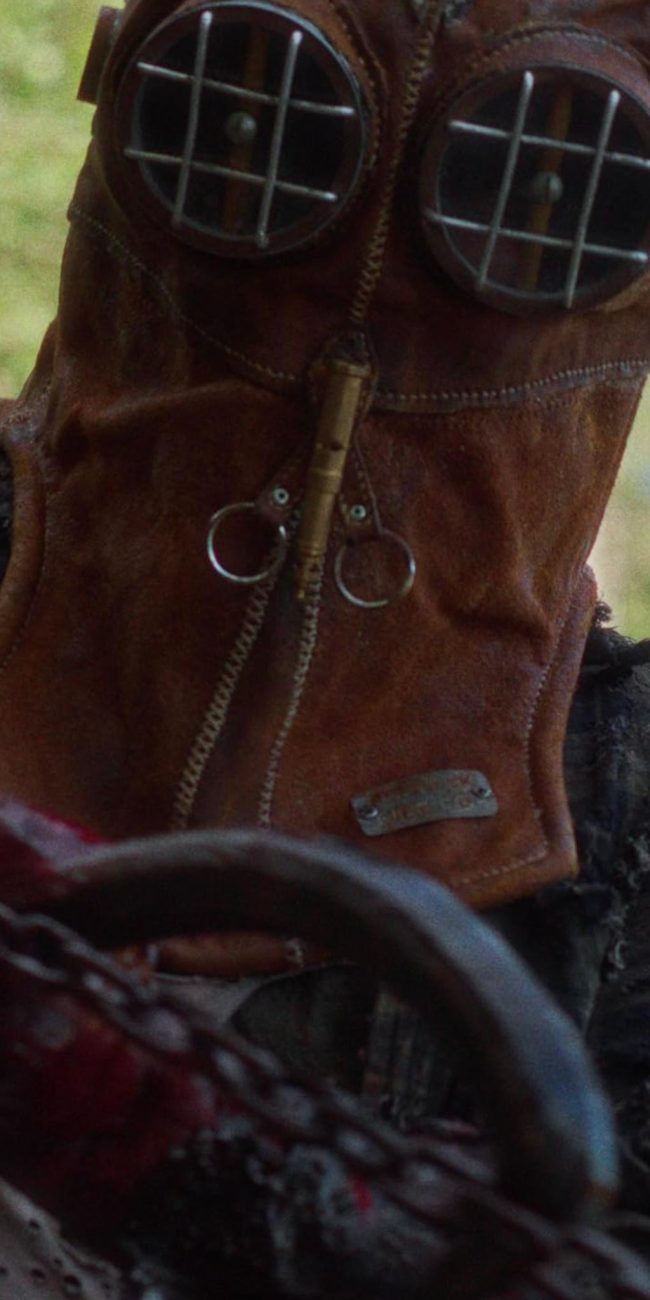A Conversation with Rachel Lears, Alexandra Rojas & Varshini Prakash (TO THE END)
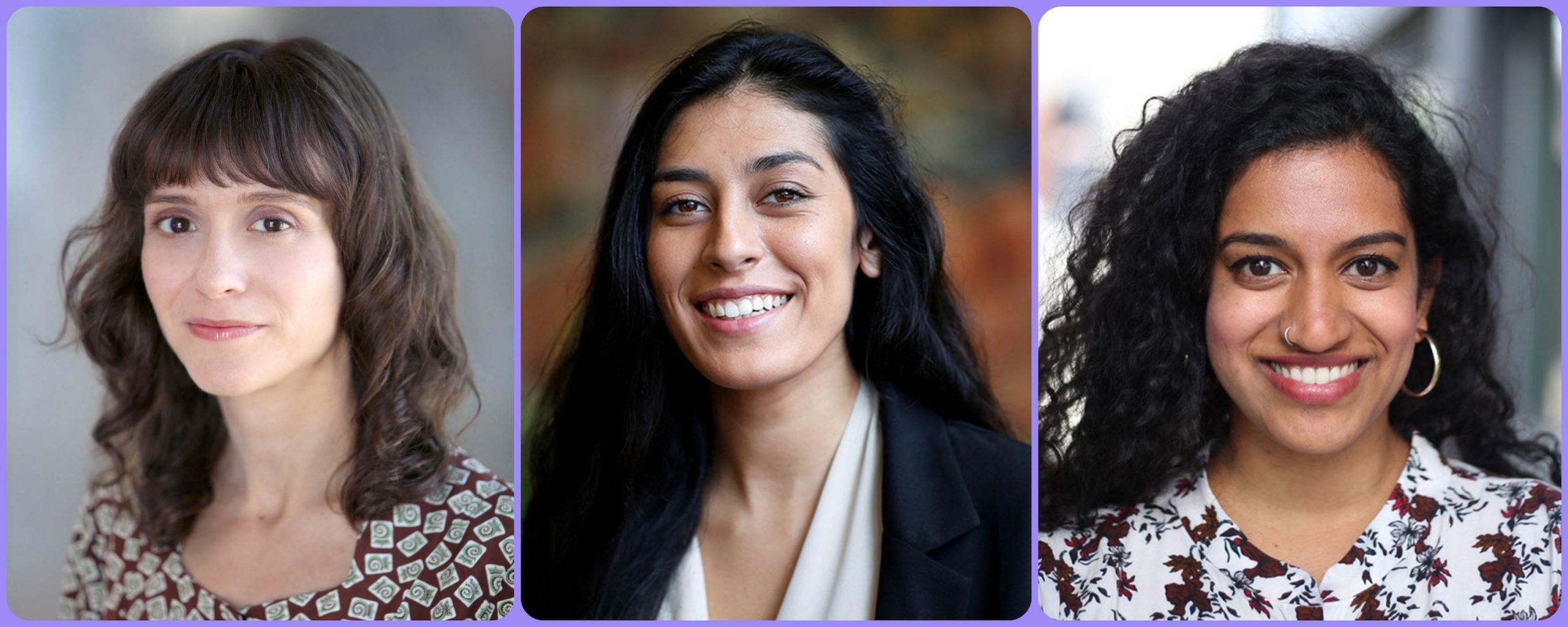
Director Rachel Lears (Knock Down the House) just premiered her new documentary, To the End, at the 2022 Sundance Film Festival. I reviewed it as part of our coverage, and while the festival was in progress I had a chance to chat with not only her, but two of her protagonists, Justice Democrats’ Alexandra Rojas and Sunrise Movement’s Varshini Prakash, by Zoom. The film takes us deep into the heart of today’s struggle to enact meaningful climate policy in the United States. The two other primary subjects, not available for interview, are Representative Alexandria Ocasio-Cortez (AOC) and the Roosevelt Institute’s Rhiana Gunn-Wright. What follows is a condensed digest of our conversation, edited for length and clarity.
Hammer to Nail: Rachel, what led you to this new documentary? Some of it looks like it may have been conceived and shot during the filming of Knock Down the House.
Rachel Lears: Well, it was definitely the process of making Knock Down the House that led to this. Of course, I knew Alexandria Ocasio-Cortez. We were talking about the possibility of another project. And I of course knew Alexandra Rojas, as well, from Knock Down the House, as she was part of the team that recruited Ocasio-Cortez and worked on that campaign.
And the thing that really galvanized my interest in focusing on the climate crisis was the UN’s IPCC report that came out in the fall of 2018, framing the question of solutions to the climate crisis as not only something that had a really shocking deadline of 2030 but was also a question of political will. So, it’s not only technically feasible, but also financially feasible. It is a question of whether we can move the grindingly slow operations of our political institutions towards the transformational changes that we need to avert the worst effects of the crisis.
Coming out of my previous work, I started speaking with the four women who are featured in the film about their work on the Green New Deal and really thinking about the film as a continuation of my earlier film’s exploration of the nature of power and how impossible things become possible through movements. And here, we have a really powerful testament to the dignity and courage of trying, in the face of just overwhelming obstacles and enemies and a crisis that’s almost too big to get your mind around. So, I think it’s a really powerful human story of what it looks like to be part of historic change.
HtN: In that previous film, you had a built-in structure because you were following the 2018 midterms and you were fortunate that at least one of your subjects won her election. Here, you didn’t necessarily have that built in. How did you come up with the structure that you have, and whence the title, “To the End?”
RL: Well, we always knew that this was potentially a more open-ended story than Knock Down the House and that it was unlikely to have as straightforwardly inspirational an ending. When you make vérité documentaries, you’re always gaming out possible scenarios of how the story might go. And in the beginning, I think we wanted to just follow it as far as we could, over the course of a few years. Of course, we had no idea just how insane the next few years would be, upending all of our lives with a global pandemic.
But I think, once it became clear what the results of the 2020 elections were, it also became clear that there was an opportunity, because the people we were following had already had a chance to influence the Biden campaigns on the issue of climate and to really foreground the framework of the Green New Deal, in the sense that that climate action needs to be tied to addressing racial and economic inequality. Then it became a question of how much will those ideas be possible to translate into legislative reality. And what does that process look like?
So, without going into all of the wonky details of the sausage-making in Washington D.C. we wanted to explore what that real tension looks like when a movement begins to get a few feet inside the halls of power. The title came from…well, it’s always a collaboration. My filmmaking partner and husband, and the editor of the film, is Robin Blotnick. I think he was the one to come up with the title. But I know I was putting together some possible titles. I remember thinking about that Wim Wenders film Until the End of the World, which has a fantastic soundtrack that I used to listen to all the time. But that title was already taken. (laughs) But it had this dual meaning of fighting to the end.
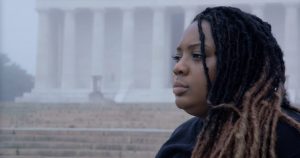
Rhiana Gunn-Wright in TO THE END
We wanted to invoke the idea of dystopia or apocalypse because it’s become so commonplace to speak about that in relation to the very real effects of the climate crisis on our lives and the lives of frontline communities, but in particularly to what’s coming down the pike if we don’t make these changes. So, by invoking that, the title gestures towards the sense that a lot of people have that we are staring into the abyss. But it’s also about the fight that the folks we’re highlighting in the film have to envision to build alternative—positive, even—utopian visions in contrast to the dystopian visions that the news presents us with, and that are so overwhelming when we think about the climate crisis.
HtN: Alexandra and Varshini, how did Rachel pitch your involvement in this story to you?
Alexandra Rojas: Well, I’ve known Rachel, like she mentioned, for a number of years now, since the very beginning of when I first started working at Justice Democrats. She’s really seen the very beginning to where we are now. And so, it was easy for me to say yes to someone that I really trust. And also, I think, because of how big of a deal this issue is. I think the Green New Deal is the intersectional solution that our movement is presenting to deal with this existential threat to our planet, to our country. And it also presents one of the biggest opportunities for America to tackle this crisis by completely transforming our economy and our society to actually work for everybody, and not just the billionaire class and the fossil fuel companies who would rather we continue to be immersed in their talking points and feel how unwinnable or nihilistic this moment can be with our political institutions and leadership seemingly not doing anything despite having the technical capacity to do so.
So, as an everyday person that’s in this fight, I hope that others can relate and see themselves in this fight for a Green New Deal. And also really clearly not only just understand the stakes but how we relate to gaining power and taking on these institutions and structures, which I think can sometimes feel abstract. How do you actually try and tackle these things? Not just from a “Oh, what are the best climate solutions?” But what does it mean to actually unseat fossil fuels’ favorite democrat in the House of Representatives? Or what does it mean to watch Joe Manchin, the Senator from West Virginia, completely block what we’ve all been fighting for? It felt important to highlight our voice in that.
Varshini Prakash: I think, at the beginning, when Rachel first started working with us, we had absolutely no idea where this fight would land us. And I think, looking back on it now over the last three years, for me, the piece that felt the most important was showing as many people as possible what it meant for young women of color. I considered myself to just be an ordinary person that had big dreams for the world and big love for our planet and its people and was working to leave behind a planet that was healthier, more sustainable than we had found it, and provide a safe and stable future for my generation and the generations who would come after me. And so, I think ultimately, I hope that the documentary can be both a challenge and an inspiration to people who find themselves at home feeling anguished about the world but having a sense that things can be better to get out there and try.
And I think the other piece of this that several others have also mentioned who are a part of the team was showcasing the voices of people like Alex and Rhiana and AOC and myself. The people who don’t often get a voice or get a say in US politics, that aren’t always at the table and frequently are excluded, on purpose, from the table, to be agitating and pushing for representation. And to have our voices heard and to have the constituencies that we represent be valued and matter in American society. And so, I hope that the documentary also offers folks on the margins of society who have been told so often, again and again, you don’t matter, you don’t have a place in power, your crises and your issues don’t matter, that they do matter and they deserve to be heard and their concerns deserve to be acted upon.
HtN: How did you negotiate this process of having somebody involved, not just in your professional activities, but also following you around sometimes at home? How was that negotiated both on your end, Rachel, and on Alexandra and Varshini’s?
RL: Well, maybe I’ll start. I mean, it’s a long process of building trust with folks. And fortunately, as I mentioned, I already knew two of them ahead of time, Alexandra and Alexandria. But it’s really tricky when you’re making a film that is adjacent to journalism and working with people who speak to the media all the time. And I think, for me, the challenge is building a relationship of trust that’s going to be able to get beyond what is a typical talking point for a media conversation. And this film provided a really interesting way to do that because we’re actually following the process of engaging with the media. So, our folks do get some of their talking points in but in a way where we’re showing the process of influencing the media and the way they’re negotiating that. And it’s not the same as a TV newscast, obviously.
So I think, for me, it’s a constant negotiation. Obviously, there were things that I wanted to film that I wasn’t allowed to film. And that’s fine. That’s part of the process. And when you’re working with people who are doing very important work, I feel it’s my responsibility to keep myself and my crew from interfering with the work that they’re actually doing. So, those are the types of conversations that we had to have on a regular basis about what are the things that we can have access to. What’s too sensitive to be filmed? What is something that we can film but we have to make sure it doesn’t go public until a couple of years from now? There’s just all of these lines that we had to talk about along the way.
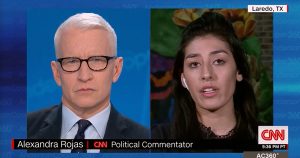
Alexandra Roja in TO THE END
AR: I think what Rachel just said was very true. I think there are those things that are important to talk through based on what we’re comfortable sharing or not. Because, as you can see, it’s a very raw film. I am a contributor at CNN. And so, just navigating the lead-ups to national TV, to being on national TV, to reacting after doing it and being in a space where there’s not many other young people or folks of my ideological perspective.
And then I think the other thing was that because I’ve known Rachel, I didn’t really even anticipate all of this stuff. You can see me reacting in real time of what it’s like going through those things. So, for me it was as Rachel described, a negotiation. But I didn’t necessarily see it at the time because I was like, “Oh, well, this is a message that needs to get out.” And I think Varshini, Rhiana and I were like, “Oh, three years have gone by very quickly.” And there’s a lot that’s happened, and it’s been a learning experience also being a part of this.
VP: You know, Rachel and Sabrina [producer Sabrina Schmidt Gordon] create trust very quickly. And so, I didn’t think too much of it. It was a little weird and I wasn’t used to it and I didn’t get into the work because of that. But for a while, I mean, they just really blended seamlessly and were extremely respectful and easy to work with. And I think they’ve really modeled for me what it looks like to work with filmmakers and artists and media-makers alongside social-movement organizations, and how to tell that story truthfully without sugarcoating or editing out the reality of what’s going on. But also, so often that relationship can be extremely antagonistic. And so, that was special for me.
I’ll just say for me personally, I think for a while I didn’t think too much about the documentary. And then about three months ago, I had this realization that it was going to come out and there’s this thing that happens that I think about frequently of how do I show up as a leader in the world authentically and be myself so that others can be that, as well, in the work, but also, how do I lead? What do I say? How do I support people to make meaning? How do I represent that it’s okay to have depth of emotion? But also, how do I lead the way to guide people who are scared and uncertain about the future forward?
And so, there were all these moments where I also started to feel like, “Wow, this is going to show me in all those moments that maybe I was a little unguarded or just fully myself. And would I be enough in those moments?” And so, I think there was this vulnerability, but all also gratitude for not showing me as the polished self that we have to be to other media or in public speaking or whatever it may be. And I think the film just did a really good job of showing all of us in the array of faces we have to hold as leaders, but also as just human beings.
HtN: Thank you for this conversation and for sharing with me what it was like to make the film.
RL: Thank you so much, Chris. I really appreciate the conversation.
2022 Sundance Film Festival; Rachel Lears; To the End documentary movie interview








